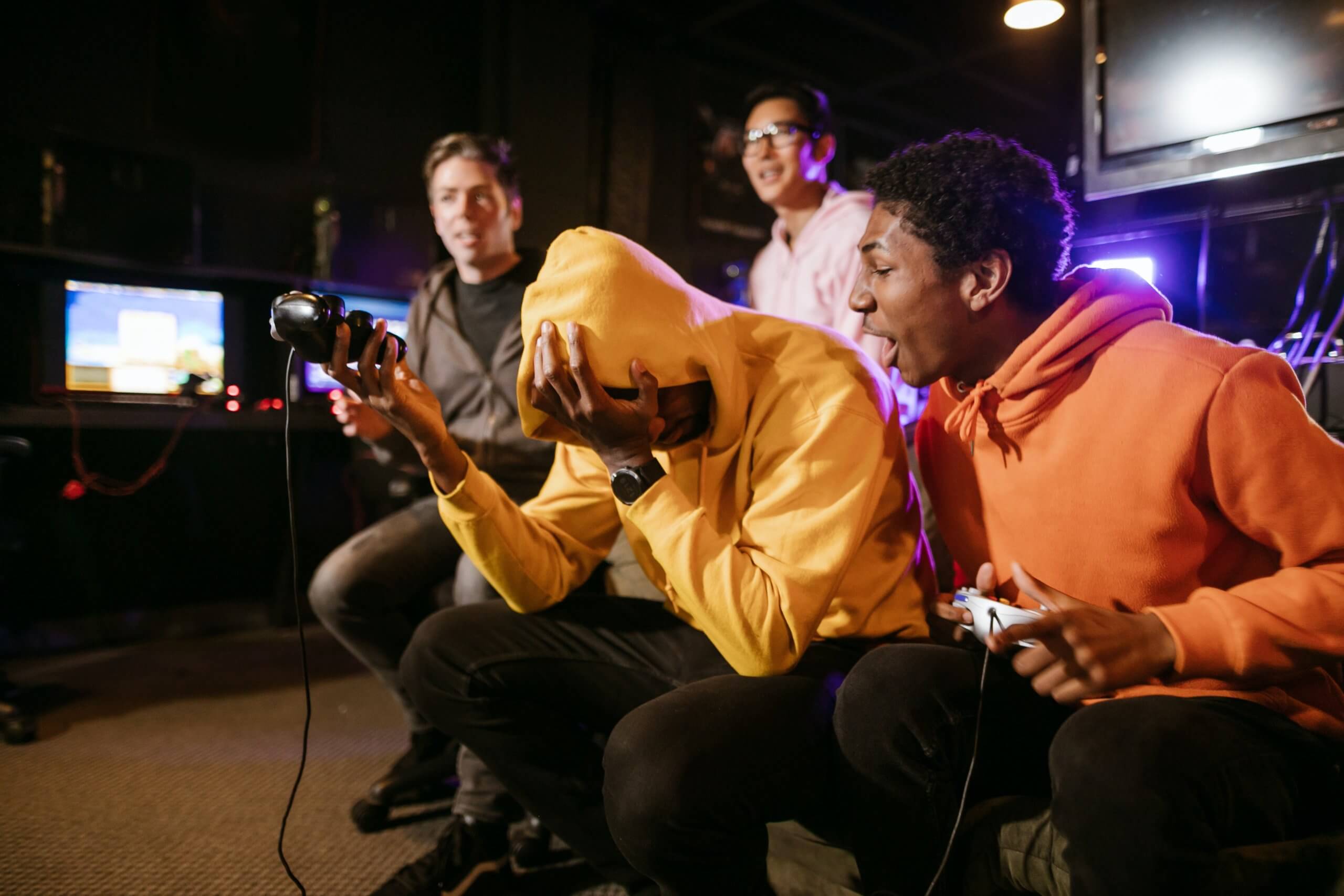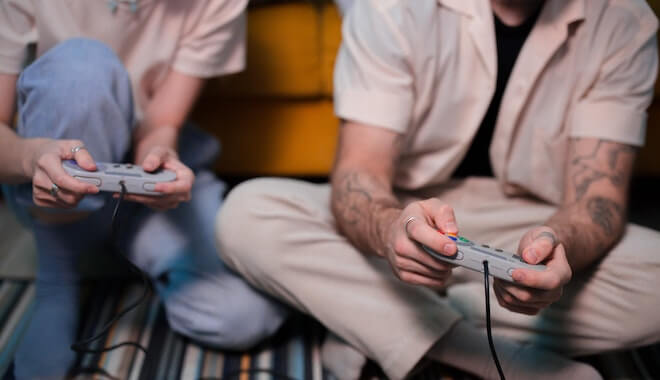Whether you’re a gamer or not, you may have wondered, “Are video games a hobby?” Yes, gaming is a fun and harmless hobby that benefits many. But for some, it may become an unhealthy vice. So, should video games as a hobby be encouraged or discouraged? This blog post delves into gaming as a casual hobby versus gaming as an addiction.
Video Games a Hobby or a Senseless Pursuit?

Are video games a worthwhile and entertaining hobby or a fruitless quest?
Playing video games is one of the most popular hobbies in the world. While we are on this topic, you may wonder, “How popular is gaming as a hobby? What percent of people play video games?”
In 2023, there are over 3.09 billion active video gamers worldwide, with the number set to rise to 3.32 billion by 2024. Additionally, 52% of video game players have at least one gaming service subscription.
Most gamers consider this a relaxing and social hobby that helps them unwind and de-stress. Video games are only one of the many leisure pursuits in life. People who enjoy video games still attend school or work, spend time with family and friends, and do daily chores.
So, is video gaming good or bad?
Advantages of Video Games
Besides being a fun pastime, video games offer many benefits. They provide a safe space to overcome challenges and quests, fail, and learn about resilience. Games can be an escape from mundane lives and allow them to explore alternative identities through immersive worlds and characters.
Even simple puzzle games can deliver similar benefits in a calmer format. For example, Sudoku is a great way to strengthen focus and patience because you have to slow down, scan for patterns, and work logically through mistakes without getting overwhelmed. Each solved section feels like a small win, which reinforces persistence and helps you return to other tasks with a clearer mind.
You can also use gaming to connect with friends and family or make new friends online and offline. Playing video games helps you socialize and stay calm and happy.
Moreover, video games can be excellent learning aids that promote the development of skills like multi-tasking, decision-making, problem-solving, communication, and teamwork. You can use these skills in your career, relationship, and social life to become a well-rounded person. You can also turn your hobby into a career by getting into esports and livestreaming.
Despite the many benefits of video games, people still criticize gaming and gamers.
Criticism Surrounding Gaming
There have been many debates on whether gaming has positive or negative repercussions on players. A 2000 article by the American Psychological Association (APA) stated that their research found that violent video games heightened aggression among gamers. But CNN reported that more recent studies have debunked these claims.
The rising popularity of video games and gaming platforms such as Steam has allowed many small companies and independent creators to carve out niches in the gaming community. Their games usually lie on the opposite end of the spectrum from the “violent video games” that some experts and parents believe harm young players.
That said, enthusiasm for gaming follows a scale that ranges from hobby to addiction, healthy to harmful. Where a gamer is placed on the scale is all about balance.
Gaming: Hobby vs. Addiction

Is gaming a hobby or an addiction? The answer to this question depends on the gamer. Millions of people can easily engage in gameplay without any adverse effects, while some may lose themselves in the darker side of video games.
Games are generally designed to be addictive, which can harm a gamer’s brain, mood, sleep, vision, and physical health. They may also cause seizures and other health conditions.
Instead of being a fun hobby, games can easily become a destructive compulsion if the scale tips, and they consume all your waking hours. If you start prioritizing gaming over other aspects of your life, your addiction may spiral out of control and damage your well-being.
The Negative Effects of Gaming Addiction
Too much gaming may negatively affect your education, career, relationships, and other favorite activities and interests. Your physical and mental health may deteriorate if you skip meals, neglect exercise, miss sleep, and forgo your personal hygiene routine because you want to keep playing a game.
Many people who suffer from gaming addiction also have poor mental health and experience stress, anxiety, and depression.
Internet gaming disorder also has social implications. Those who once loved playing games with loved ones may try to cover up their addiction and withdraw from social situations, becoming isolated and lonely. It may lead to lost confidence, low self-esteem, and difficulty talking to people in real-life situations.
So, it is crucial to pay attention to your gaming behavior and see if it has transformed from a fun, relaxing hobby to an all-consuming addiction.
Here, we discuss the three-step process of cultivating new habits to help you understand how habits and addictions develop. It will help you understand how gaming leads to addictive behaviors and tackle them effectively.
Three-Step Process of Building New Habits
Developing habits and addictions involves these three steps:
1. Trigger
A trigger is the underlying factor of a person’s action. It prompts you to do something like sitting on the couch and watching TV after a long day at school or work or playing a video game whenever you have free time.
2. Action
An action is an activity or task that leads to a reward.
3. Reward
Rewards are achievements that may take any form. It could be feeling fresh after showering or the satisfaction of reaching the next level in a video game.
Tackling Addictions
Combating addictions involves substituting actions to get a reward with another, more favorable action while leaving the trigger and reward intact. This may be challenging, but there are many ways to ease the process of changing behaviors.
Killing an addiction is a Sisyphean task, so taking it slow and being kind to yourself is essential.
It is best to find a new hobby that can replace gaming. It could be dancing, running, hiking, reading, cooking, etc. Something that will take your focus for extended periods and lead to satisfaction.
Remember that gaming is not a fundamentally bad thing. But when it becomes an all-consuming activity that takes over everything in life, it becomes an addiction. Gaming in moderation is the key to enjoying it fully—and it will not turn into a vice.
Limiting the hours in front of screens and doing healthier activities like meeting people in the real world, exercising, and getting timely sleep and nutrition can help keep your gaming hobby in control.
Wrapping Up
Video games are a legit hobby and a source of happiness for countless people worldwide. They offer a place to escape life’s challenges and daily stress, boost our mood, and enhance relaxation.
But as with every hobby, practicing moderation when playing games is important to stay healthy and productive.
Sources:
- https://mediamilwaukee.com/culture/gaming-legitimate-hobby/
- https://www.sciencedirect.com/science/article/pii/S2666956022000368
- https://www.nature.com/articles/s41415-019-1106-9